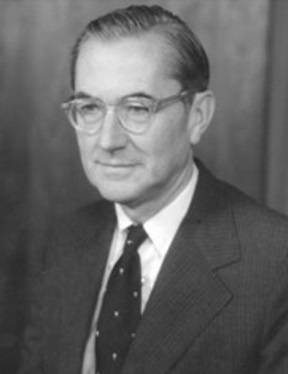William Colby has become a more or less forgotten figure in the turbulent history of the 1960s and 1970s. However, he played a critical role in the execution of American foreign policy for thirty years. University of Arkansas professor Randall Woods’ new biography, Shadow Warrior: William Egan Colby and the CIA, may help put the spotlight back on the former Director of Central Intelligence.
This biography tells the story of William Colby (pictured right), the man, but also of the CIA and the Vietnam War. During WWII, Colby was reassigned to the Office of Strategic Services and dropped into France prior to the Normandy landings in order to coordinate with the Resistance. After Allied forces had cleared France, Colby was part of a similar mission to Norway.

After the war, Colby worked first as a lawyer in “Wild” Bill Donovan’s New York law firm, and then in 1949, he took a position with the National Labor Relations Board in Washington. The next year, bored, he accepted a position with the newly created CIA.
Colby was assigned to the “Plans Division”—what we now call operations. By now, the Cold War was in full swing. Colby’s first assignments were in Europe, preparing for a Soviet invasion of Scandinavia and preventing the political success of the Communist Party in Italy. In 1959, however, Colby was given the assignment that would consume his career with the CIA: South Vietnam.
The South Vietnamese regime headed by Ngo Dinh Diem was problematic from the American perspective. Because the previous war against the French was carried out throughout all of Indochina, many military and political personnel in South Vietnam had been comrades of Ho Chi Minh and the Viet Minh. Furthermore, the Ngo family was Catholic. The Buddhist majority in South Vietnam barely tolerated “the House of Ngo” and often opposed it. When the Ngo government attempted to repress the unrest, Buddhist monks protested by setting themselves on fire.
According to Woods, Colby along with other CIA operatives in South Vietnam (which would eventually include Daniel Ellsberg) worked against the counter-productive policies of the Ngo government. They urged Diem to adopt some sort of popular program to counter that of the Uncle Ho.
Viet Cong were already active in the countryside at this time. In response, the CIA convinced the Ngo government to support their establishment of Civilian Irregular Defense Groups, beginning with the Montagnards, a minority group near the Laotian border in the Central Highlands. This operation became a victim of its own success. Soon, Montagnards were being used as conventional troops as the conflict evolved from a cold war to a hot war.
At the same time, the South Vietnamese Army had had enough of Ngo Dinh Diem and his brother who was head of security. When they proposed a coup in 1963, Colby advised against American support. Eventually, he was overruled and the action was encouraged by Washington. During the coup, a couple of mid-level South Vietnamese officers murdered both Ngo brothers. The CIA did not play a direct role but was instrumental in putting the wheels of it in motion.
In the aftermath, a full-blown war was not a foregone conclusion, but that was the way it worked out in 1964. From the first deployment of conventional American troops, the CIA’s role in Vietnam was characterized as a constant tug-and-pull between the Army’s conventional war and the CIA’s “other war.” From 1959 to 1971, Colby was at the center of that other war.
At that point, Colby returned to Washington to serve as CIA Comptroller. Richard Nixon and his National Security Advisor, Henry Kissinger, were deeply hostile to the CIA, demanding deep cuts in the agency’s budget and forcing the ouster of two directors. Colby, as Comptroller, worked to implement those cuts, and thus Colby was seen by the Nixon White House as a reliable candidate for director. To some extent, he was the last man standing. Amid the Watergate scandal, Colby was appointed.
Colby’s tenure as Director was one of crisis management. Many of the Watergate plumbers were connected to the CIA. The press had also started asking questions about CIA involvement in the coup in Chile. It had also come to light that the CIA had been investigating anti-war protesters. According to Woods, Colby was so tied up in Vietnam that he had nothing to do with any of these scandals. Nevertheless, it was his job to clean up the mess.
In the process, Colby revealed what were known within the Agency as “the family jewels.” This was a compilation, prepared during Schlesinger’s short tenure, of every operation in which the CIA had been involved that might be construed as illegal. Given the post-Watergate tenor of the Congress, the media, and the public, one gets the impression from Wood’s treatment that Colby felt he had no choice but to reveal what he did to the Church Committee.
As a biographer Woods plays it straight in this study. He strictly adheres to the perspective of his subject, William Colby. As a result, critics of the CIA will find this book one-sided. That said, this is a well-written narrative from within the CIA, one which goes a long way toward explaining conditions on the ground in Vietnam.
